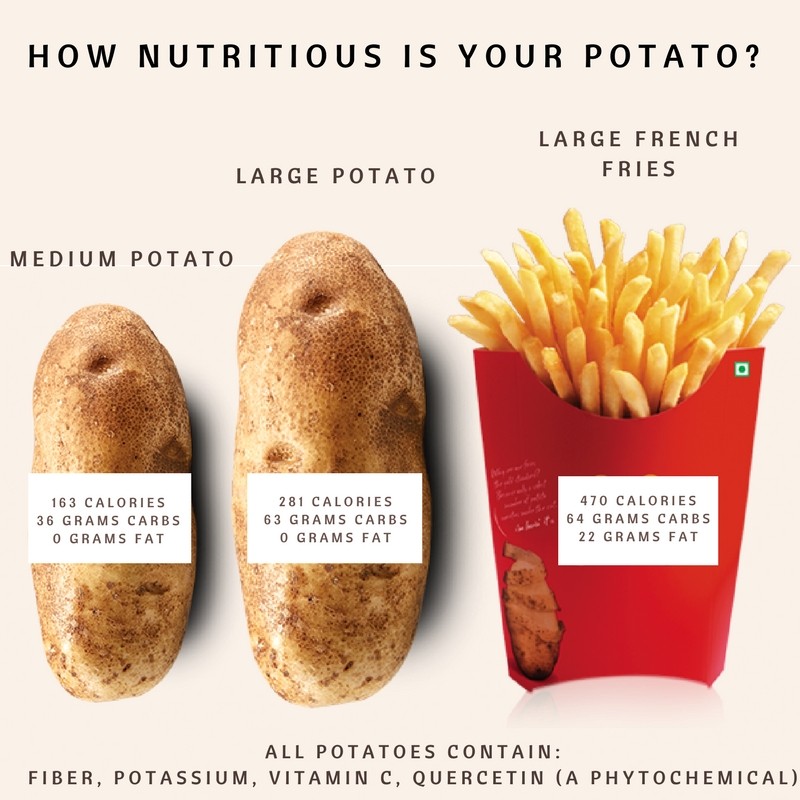Q: Are potatoes bad for you? I read that eating too many is unhealthy.
A: It can be confusing to make sense of how potatoes fit in healthy eating habits. Some sources talk about potatoes as loaded with nutrients, yet others say potatoes don’t even count toward goals of eating more vegetables. Here’s the scoop….
Nutrients, Calories and Phytochemicals – A medium potato is rich in vitamin C and offers even more blood-pressure-friendly potassium than two medium bananas. Potatoes provide other protective nutrients, including the phytochemical quercetin and dietary fiber (particularly with the skin on).
Along with corn, peas and lima beans, potatoes are categorized as a starchy vegetable. Each serving has more carbohydrate and calories than non-starchy vegetables like broccoli, lettuce or tomatoes, making some people think potatoes are high-calorie.
 A medium potato – defined by the USDA Nutrient Database as about 2 ¼” to 3 ¼” in diameter — has about 160 calories. Potatoes are also relatively low in calorie density – how many calories a food contains per ounce – which research suggests is important for weight management. Although not as low in calorie density as non-starchy vegetables, plain potatoes are somewhat lower in calories than a similar portion of rice or pasta.
A medium potato – defined by the USDA Nutrient Database as about 2 ¼” to 3 ¼” in diameter — has about 160 calories. Potatoes are also relatively low in calorie density – how many calories a food contains per ounce – which research suggests is important for weight management. Although not as low in calorie density as non-starchy vegetables, plain potatoes are somewhat lower in calories than a similar portion of rice or pasta.
Glycemic index – Another concern cited about potatoes is it that it ranks relatively high on the glycemic index, a measure of how much carb-containing foods raise your blood sugar. Research demonstrates real health concerns from blood sugar surges after eating.
Studies also show that flavorings and other foods that accompany a food change how it affects blood sugar.
Smart Choices for Potatoes in a Healthy Diet
High-nutrient preparation – How you prepare potatoes affects nutrient content. Boiling – especially with skin removed – allows nutrients to leach into the cooking water. Baked or microwaved potatoes have from 40 to 100 percent more potassium, and about twice the amount of vitamin C, as boiled potatoes.
Watch your portion – Small and medium potatoes are a rich source of potassium and moderate in calories and carbohydrate. Yet baked potatoes commonly served at restaurants are two to three times that size. That size potato, or the large order of fries that has become the norm, provides as much carbohydrate as three to four (or more) slices of bread. When that’s what you see, split it with someone, or save half for another meal.
Yet when we look at dishes from India, Spain and elsewhere in Europe, we see that potatoes can be part of mixed vegetable dishes loaded with a variety of nutrients.
Variety among vegetables is vital to get the full spectrum of nutrients and phytochemicals that promote good health. So it’s disturbing that more than a quarter of the small amount of vegetables Americans eat comes from potatoes – or any one vegetable choice.
Rather than focus on avoiding potatoes, think about expanding the amount and variety of other vegetables you eat each day.
AICR HealthTalk is by Karen Collins, MS, RDN.
Karen Collins, MS, RDN, CDN, is AICR’s Nutrition Advisor. Karen is a speaker, writer and consultant who specializes in helping people make sense of nutrition news. You can follow her blog, Smart Bytes®, through her website and follow her on Twitter @KarenCollinsRD.






I have heard that French fries are ‘bad’ for you
along with potatoes chips.
The problem lies in the fat content, which is high and the making of cancer causing chemicals during frying process, such as acrilamide, for example.
As stated within the article, potatoes, along with bananas, beets, raisins, nuts, etc., contain high amount of potassium. That’s not a bad thing unless you have hyperkalemia, or excessive amount of potassium in your blood. This is a potential indication that your kidneys are not functioning adequately, and if left untreated, it can cause and/or contribute to heart problems. The key as also noted in the article is to practice moderation and eating a variety of vegetables and fruits.
Loved this piece. Can’t wait to read your next blog 🙂